World Environment Day Dedicated to Ecosystem Restoration
ZAGREB, 5 June 2021 - World Environment Day is observed on 5 June and this year it is dedicated to the restoration of ecosystems, whose resources are the foundation of the social and economic progress of humankind as well as people's health and wellbeing, Croatia's Economy and Sustainable Development Ministry has said.
Ecosystems play a significant role in the prevention of health crises such as COVID-19 because by destroying natural ecosystems, people have significantly increased the risk of illnesses passing from animals to people.
The ministry says the necessity to protect nature and the environment is also reflected in the fact that, according to the World Economic Forum, half the global GDP ($40 trillion), depends moderately or strongly on nature.
Given that many ecosystems have been irreversibly destroyed and others considerably degraded, our survival depends on the speed of action and clear international community coordination for their preservation and renewal, the ministry says.
Therefore the United Nations Environment Programme, first with a resolution on 1 May and then with the Decade on Ecosystem Restoration movement, which symbolically kicks off with this year's World Environment Day, has called on all governments, the business sector, the expert and scientific community, and the wider public to prevent further degradation of ecosystems and to ensure a future for the generations to come, the ministry says.
That's why it's necessary to raise public awareness of the fact that humankind spends by the middle of the year the Earth's capacities that should suffice all year, it adds.
Ecosystem restoration, together with transition to a circular economy and a climate-neutral society, can simultaneously prevent poverty, hunger, loss of biodiversity, climate change, and uncertain access to drinking water, the ministry says.
The director of Greenpeace Croatia, Zoran Tomić, has told Hina that it's important to make cities greener and enable them to really recover.
City and local authorities now have the opportunity and duty to launch ecological transition to alleviate the effects of climate change and health crises, he says.
WWF Adria has called on citizens to demand of the authorities to implement concrete nature protection measures and support, through various campaigns, all those who contribute to nature preservation and protection.
Animal Friends Croatia has announced that on the occasion of World Environment Day, it will send all Croatian MPs a brochure on food and the ecology to explain the link between breeding animals for food and world hunger, global warming, water consumption and deforestation.
For more about ecology and environment in Croatia, follow TCN's dedicated page.
CASCADE Project: Italy and Croatia Collaborating on Ecosystems Monitoring
June 4, 2021 - With the scientific community in Croatia busy and involved in international projects, meet the CASCADE Project. Learn how Italian and Croatian scientists are working together in monitoring ecosystems.
Croatian scientists in Croatia are running various projects which either don't get reported on by journalists, or if they are reported on, they sadly don't get too much attention from the public.
One such project is the Projekt CASCADE which started back on January first, 2020, and will continue until the very end of 2022.
As reported on the website of The Institute of Oceanography and Fisheries (IOR), the 5,817,547 euros, 85 % of that capital (4,944,914.95 euros) is secured by The European Regional Development Fund (ERFD).
CASCADE is short for „CoaStal and marine waters integrated monitoring systems for ecosystems protection and management“, and is part of the Interreg Italy-Croatia 2014-2020 strategic program. Assess the quality of coastal marine ecosystems in order to restore the habitats of endangered species and provide support for integrated management is the main goal set by 2022.
For the next three years, the project team from the Laboratory for Plankton and Shell Toxicity and the Laboratory for Chemical Oceanography and Sedimentology will work on monitoring, gathering knowledge about habitat and ecosystem biodiversity in the field of project cooperation (Adriatic Sea). It will participate in the establishment of new, as well as the improvement, of existing coastal systems for monitoring and management of coastal and open water ecosystems. Joint actions will assess and protect coastal and marine biodiversity and establish restoration actions. The pilot area of the Institute of Oceanography and Fisheries (IOR) within the EU CASCADE project is the mouth of the Neretva River“, explains the IOR website.
There are eleven pilot areas in Croatia and Italy where the researches will be conducted: lagoon Grado and Marano and Gulf of Trieste, coastal belt of the Italian region Emilia-Romagna, marine protected area Torre Guaceto (natural reef), Punta Della Contessa, Melendugno in the Italian region of Puglia, the mouth of the Neretva river, the coastal zone of the Italian region of Veneto, mouth of the river Miljašić Jaruga, coastal belt of the Italian region of Molise, the northeastern part of the Adriatic Sea in Croatia, mouth of the river Cetina, Torre del Cerrano and Pineto Marine Park on the Abruzzo coast, and finally, the coastal zone of the Italian Marche region.
„At the mouth of the Neretva River (P4 pilot area), the IOR team members will sample sediment, shells, and seawater, depending on the type of matrix, they will analyze various parameters such as salinity, oxygen concentrations, heavy metals, and nutrients, with the aim of establishing an optimal system of observation of coastal and open waters“, added IOR.
The head of the projects within the IOR side is Dr. Sc. Ivana Ujević and various Italian and Croatian regions/counties, regional development agencies, scientific institutes, and two ministries from Italy and Croatia are included as associated partners.
Learn more about Croatian inventions & discoveries: from Tesla to Rimac on our TC page.
For more about science in Croatia, follow TCN's dedicated page.
Coastal Hazard Monitoring: New Method Developed by Ruđer Bošković Institute (IRB) Scientist-Led Team
June 3, 2021 - With climate change bringing trouble to the coast, coastal hazard monitoring is a must. Meet the new method developed by a research team led by a scientist from Ruđer Bošković Institute (IRB).
Individuals from the scientific Ruđer Bošković Institute (IRB) in Zagreb continue to catch the attention of internationally established scientific journals, such as Marine Science ranked in the top 10% of magazines for the issues of sea and water biology.
This time, IRB's dr. Cléa Denamiel led an international research team that presented an innovative concept of warning on coastal hazards with stochastic methods.
Authors at Standford.edu in a pdf presentation are presenting stochastic methods as methods that involve random variables. They gave an example of multiple arrows flying towards a rock from multiple directions. When they hit the rock, arrows are positioned randomly.
„Nevertheless, you can still use their positions to estimate the location of the target“, explained Standford.edu presentation.
So, the presentation further elaborated that „like using randomly-positioned arrows to estimate the position of a target, stochastic methods have the goal of gaining information out of randomness“.
„To put it simply, current systems of warning are based on numerical methods that require advanced informatical resources, living a huge carbon dioxide print on the environment, while with the suggested appliance of stochastic methods to optimize forecast of coastal hazards and greatly reduce the need for informatics resources while taking elements of coincidence into account“, explained IRB in its official press release.
This is very important as coastal areas are under the increasing influence of climate hazards, particularly sea-level rise. IRB states that its predicted hazards related to sea level directly impact around 630 million people around the world by 2100.
The new method of warning and quantifying data on coastal hazards presented by dr. Denamiel and her team is innovative as all current systems for such monitoring are much more complexed as they are based on numerical models from kilometer to the meter of clearance.“The suggested approach would require fewer resources while keeping or even improving forecasts and assessments of coastal hazards“, concluded, dr. Ivica Vilibić from IRB.
Learn more about Croatian inventions & discoveries: from Tesla to Rimac on our TC page.
For more about science in Croatia, follow TCN's dedicated page.
Journalist Clickbait Victim: The Curious Case of Mystery Fish on Korčula
June 2, 2021 - When TC editor Iva Tatić caught the fish nobody could identify, TCN reporter Ivor Kruljac jumped to action in the hope he will find a marine life scoop. But after the dramatic realization that Atlantic lizardfish is nothing spectacular, he became a journalist clickbait victim. Meet the mystery fish on Korčula.
It was early evening between 7 pm-8 pm on the eastern Korčula coastline on May 28. After a long week of handling the Total Croatia site, TC editor Iva Tatić decided to chill and went fishing. Instead of managing the multilingual site that brings you the best tips on how to travel and enjoy Croatia, she must've been happy with the idea she can enjoy in Croatia herself, as she was preparing two hooks – one with a squid and the other with the piece of bread. Marine life must be very humble cause instead of a squid (absolutely delicious, either fried or grilled and stuffed with swiss chard), the bread was the taken bait for the careless fish soul underneath the Adriatic surface.
Iva took the opportunity and caught its prey, but pretty soon, happiness for the catch was additionally spiced with curiosity.
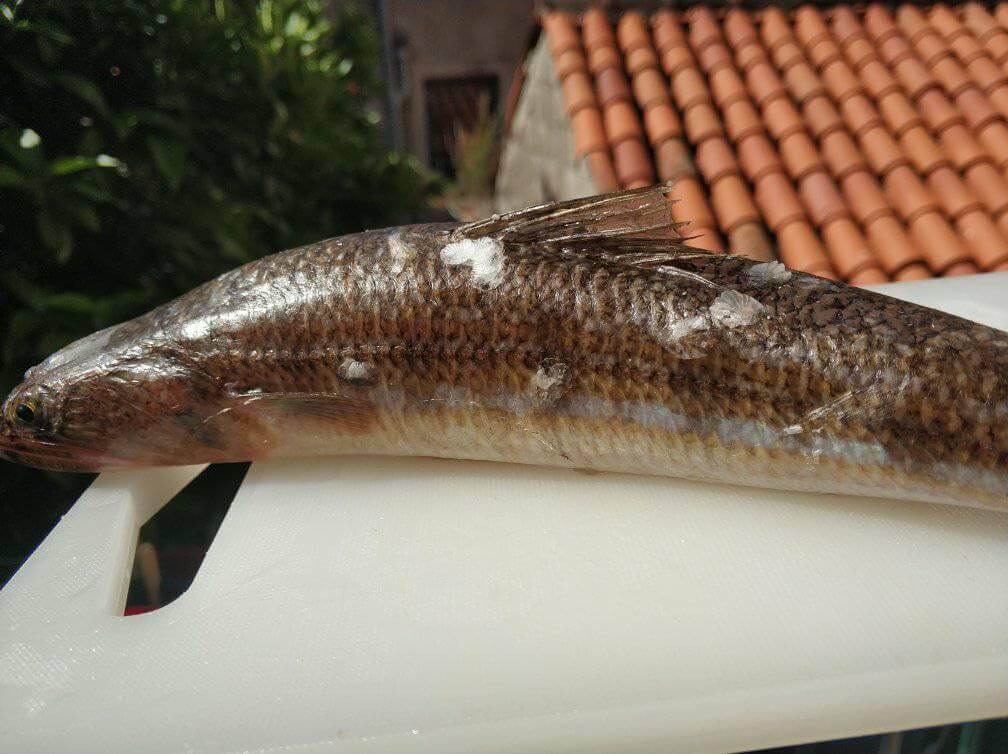
the source of curiosity and happiness © Iva Tatić
„What the hell is this?“ Iva asked the local Korčula fishermen showing them her catch.
And „no idea“ was the consensus by other marine life hunters.
„Locals call it the spider“, said a local fisherman known as Pero to Iva. „It looks like Spiderman“.
Iva didn't feel that Spiderman is an accurate comparison, and as no one really knew the answer, the whole thing went online.
After Iva shared the photos of its catch on Facebook, the online jury narrowed the mystery to two possible suspects: Saurida and Atlantic lizardfish.
Still being new and wanting to gain recognition in the newsroom, I took on myself to investigate what exactly is this Aquaman-Spiderman-love-child. Perhaps it's something invasive, a threat to the lovely Adriatic, and a fantastic journalist story.
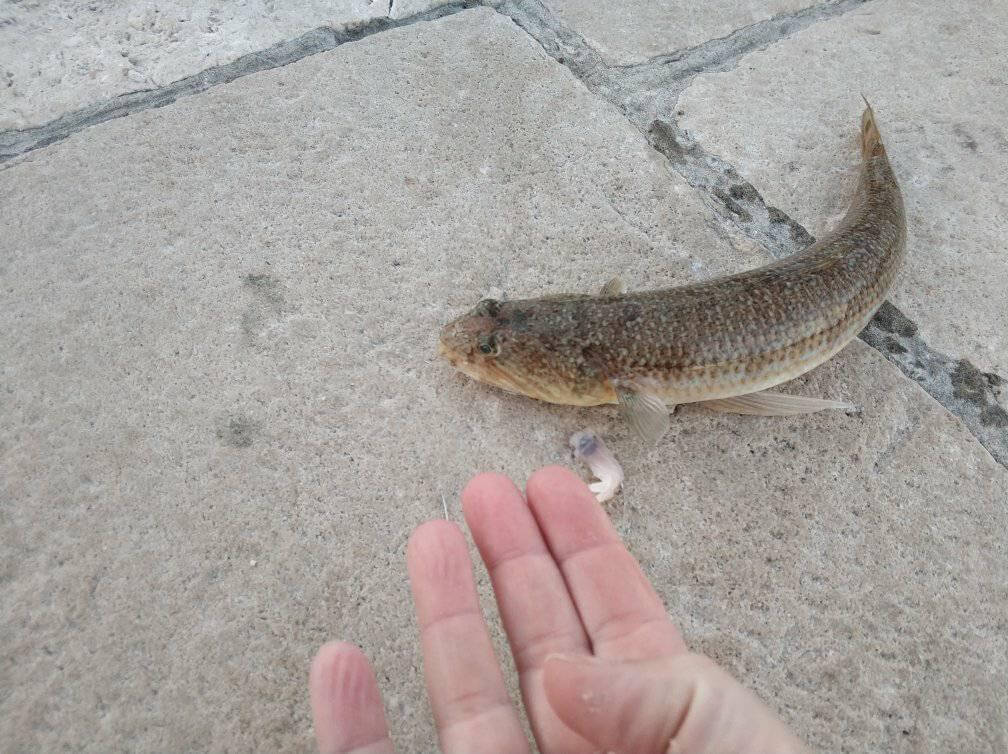
The case, the challenge, the scoop © Iva Tatić
Word on the expert street
A little bit of browsing through the pages of Rovinj Sea Research Centre (CIM), and a few calls, led me to the CIM Senior scientific associate, dr. Andrej Jaklin.
„It looks like Atlantic lizardfish, I saw that fish in person on Pelješac 15 years ago“, said Dr. Jaklin on the phone while looking at the images of the catch I sent him.
Jaklin's memory also seems fit with Pelješac being close to Korčula Island. Still, he said he can't really tell me too much about the fish and recommended it to me to contact dr. Marcelo Kovačić from the Natural History Museum Rijeka. However, dr. Kovačić, a curator for vertebrates, was on vacation, so the call was picked up by Milvana Arko-Pijevac, curator for marine invertebrates.
„I think this could be an Atlantic lizardfish, the head looks like it should, but I'm specialized for invertebrates, mollusks and shellfish“, said Silvana Arko-Pijevac.
So until that point, two experts for marine bio life are certain this is an Atlantic lizardfish (Synodus saurus). Fish, from Atlantic, I thought. Are we talking about an invasive species that manage to come to the northern dead-end of the Mediterranean all the way from the Atlantic? If so, is it hazardous to the domestic sea life of the Adriatic?
Despite recognizing the fish, neither Jaklin nor Arko-Pijevac couldn't say more details, but it's worth noting that the scientific community can once again serve as a role model to everyone who thinks they are experts on everything (both in Croatia but a trend we see spawn worldwide). Instead, my interlocutors accepted and pointed out the limits of their knowledge and suggested me someone who knows more.
Clickbait: It's not just for journalists anymore!
It took me a while to reach Dr. Jakov Dulčić from the Laboratory of Ichthyology and Coastal Fishery at the Institute of Oceanography and Fisheries in Split. First, he was not in the office, and later, he was at a meeting. But, with Arko-Pijevac's claim that Dulčić is the best ichthyologist in all of Croatia, it was worth the wait.
Finally, my mobile phone impulses from Zagreb caught dr. Dulčić in Split, and I excitedly asked him for help. To identify and say a bit more about the mysterious fish fishermen in Korčula failed to recognize, but is suspected to be the Atlantic lizardfish.
„I have to see the photos to say for certain“, said Dulčić.
„I already sent them to your e-mail before this call. Can you please refresh your E-mail?“, I asked with hearable excitement in my voice and suspense in my gut.
The suspense only grew as Dulčić was opening the e-mail.
„Found it!“, he said and I almost screamed out of excitement,
„Yes, indeed, that is the Atlantic lizardfish“, confirmed Dulčić with a relaxed voice while I was ready to ask tons of questions about this weird and possibly invasive species.
„But that is neither exciting nor anything special to catch in the Adriatic“, continued Dulčić with the same chilled tone.
I listened to that sentence with a blank expression fortunately, nobody has seen it except the walls in my apartment.
„You might think it's unusual in Croatian waters because of its name, but it's the normal fish that lives in Adriatic“, added Dulčić.
I couldn't help but think what a sour poetic justice. Being a journalist, a member of the profession in which some of my colleagues try to catch views by clickbait, to be hooked (pun intended) on a clickbait in scientific terminology.
„They can be found across the Adriatic sea, everywhere in Croatia. Their population used to be smaller in the previous years, but it recently got larger. It seems they have certain cycles, but it's nothing spectacular“, he concluded.
„But how come none of the fishermen recognized it?“, I asked puzzled.
„Interestingly enough, it is often caught, but it can rarely be seen on the fish market, and that's a place thanks to which you can usually recognize fish“, explained Dulčić.
However, informing and educating fishers and the general public about marine life in the Adriatic is something dr Dulčić and the Oceanographic Institute are very dedicated to.
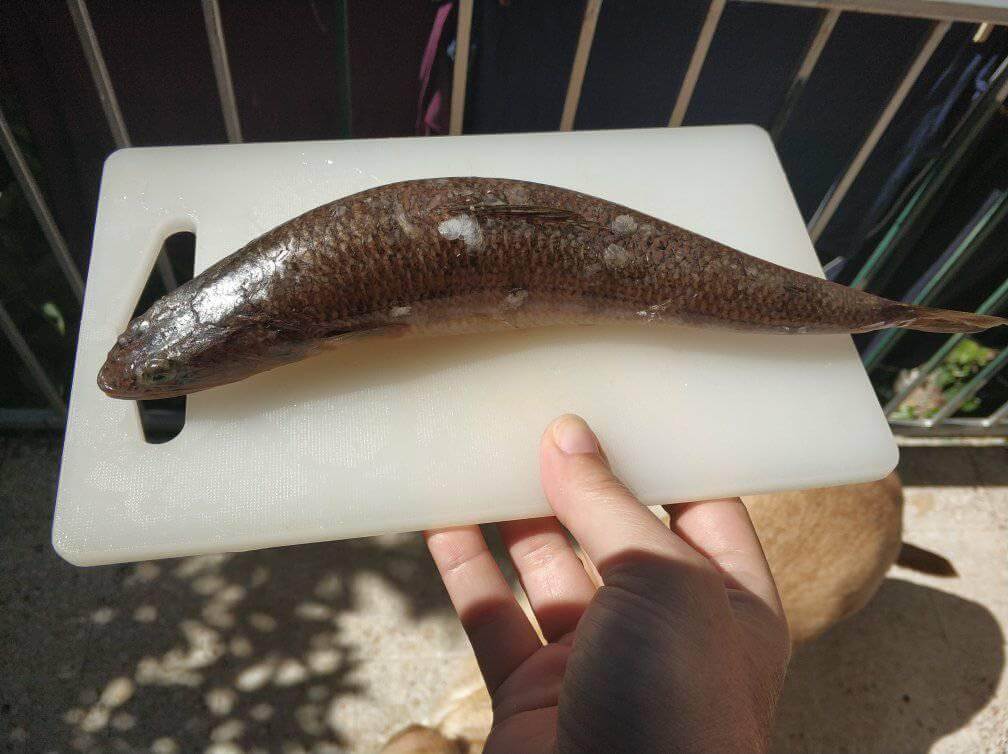
Presenting you the Atlantic lizardfish © Iva Tatić
This is evident by the LEKFishResCRO project.
„This project will address the need to improve knowledge on the trends in Adriatic fisheries with novel methods as well as to acknowledge recent changes in fish biodiversity in a complex Adriatic ecosystem. The central objective of the project will be to evaluate the potential use of the LEK in developing the knowledge base for fisheries management and conservation. The strategy employed for this evaluation will be a two-way discussion between fisherman and other stakeholders from one side and fisheries biologists from another side around the subject of what sorts of indicators of ecosystem health would make sense in light of both the LEK of the fishers and the research-based knowledge (RBK) of the fisheries biologists“, says LEKFishResCRO website, and with loads of materials, you can check yourself.
„We collaborate well with fishermen, we work on their education, and with their tips and images they sent from the field we quickly gather research data“, explained Dulčić.
The invasive species are legitimately a threat to Adriatic, and it comes from the Red Sea through Eastern Mediterranean, but these examples are excellent topics for some other articles.
In the meantime, the mystery fish is identified as a mainstream species in the Adriatic. Somewhat newsworthy (maybe?), but this time my ship returned without a scoop from the stormy cruise in the sea of information.
I sent a message to Iva explaining what she caught (which she already found out on her own, she is a good journalist after all), and I only confirmed that she can unfreeze it and eat it safely. Additionally, I found this recipe at least.
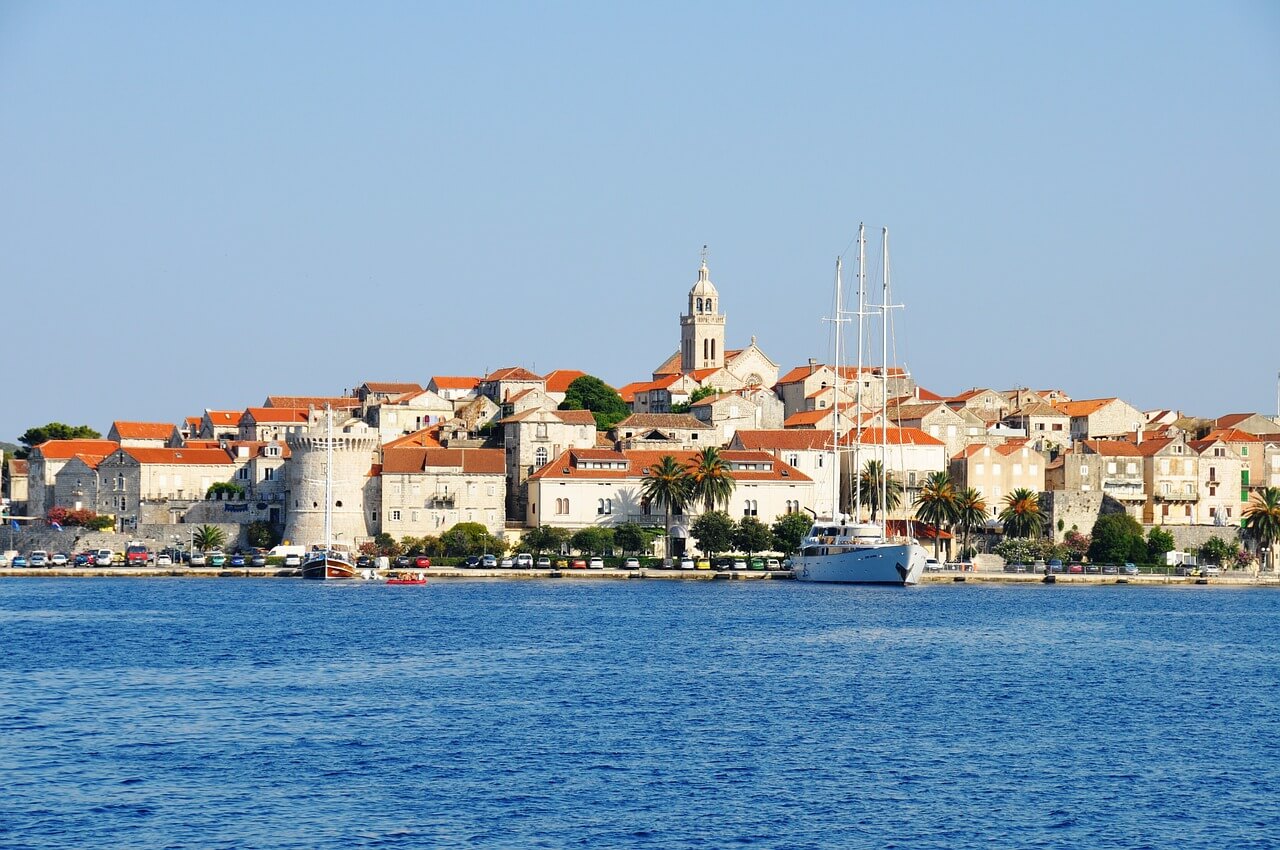
Korčula and Adriatic Sea, Pixabay
Enjoy the Adriatic, but respect marine life
In an attempt to conclude this investigative piece (let's pretend it is one, please) on a socially responsible and eco-friendly note, I asked dr Dulčić if there are any type of fish tourists and locals shouldn't fish because it's on the verge of extinction and if caught it should be returned to the sea immediately. „Such fish is living in areas and conditions where you can't catch it with hooks or nets. But Do not dive out noble pen shells (Pinna nobilis), or disturb mammals such as dolphins. And be careful around sharks and jellyfish“, concluded dr. Dulčić.
Learn more about Korčula on our TC page.
For more about science in Croatia, follow TCN's dedicated page.
REPLACE Project from Horizon Europe: Third Primorska-Goranska County Renewable Energy Meeting Held in Rijeka
May 26, 2021 - With Energy Institute Hrvoje Požar (EIHP) being the lead partner, the REPLACE Project from Horizon Europe steadily continues the progress of renewable energy for the Kvarner region.
Earlier in January, TCN wrote about Croatian energy development, whose goal is to be based on clean technologies. And that it's not all empty talk, as shown by the third meeting of a local workgroup enrolled in the REPLACE Project. As Energy Institute Hrvoje Požar (EIHP) reports on its website, the REPLACE Project has a goal of supporting European energetic, climate, environmental, economic, and social goals with the deadline until 2030 and 2050.
As part of the OBZOR 2020 (Horizon Europe) EU program for research and innovations in the 2014-2020 time frame, the REPLACE Project receives EU funding. Twelve partners from nine countries participate in the project, and EIHP is in charge of the project activities in Primorska-Goranska county. In support of European goals, the plan of REPLACE Project is to gradually switch the current ineffective and outdated heating and cooling systems with new efficient systems which rely on renewable energy.
The meeting held at the Faculty of Economics at the University of Rijeka saw Dražen Balić, Antonia Tomas Stanković, and Lea Leopoldović from EIHP hold lectures presenting results of the first period of the project, but also the plans for future activities. The accent was put on implementing campaigns and collective actions supported by the members of the local workgroup. Energetic poverty, gender aspects, and „lock-in effect“ (an economic practice, where a company makes it extremely hard for their customers to leave them, even if the customer wants to) are the obstacles the project runners are aware of and were explained in greater detail. Another thing that stood out in the presentation was the presentation „Technology of Blue Energy in Croatia“, which presented modern technologies used in heating and cooling in coastal areas, and applicable to the Primorska -Goranska county.
Key institutions in the regions such as REA Kvarner (regional energy agency), Energo Rijeka (gas and heat energy provider), representatives of the Primorska-Goranska county, OIE Hrvatska (The economic-interest association The Renewable Energy Sources of Croatia - RES), and Rijeka Consumer Centre were present at the meeting, showing that the motivation to bring energy efficiency in Primorska-Goranska County is in its full strength. Both on corporal, political, and expert levels.
Learn more about Rijeka on our TC page.
For more about science in Croatia, follow TCN's dedicated page.
Friends of Croatia: British Embassy - Brexit an Opportunity to Deepen Already Good Relationship
May 20, 2021 - The fifth article in the series "Friends of Croatia: British Embassy", saw TCN reporter Ivor Kruljac sit down with the UK Ambassador Andrew Dalgleish and discuss all things regarding diplomatic relations between the UK and Croatia. Diplomatic relations are, overall, really good and developing well, with Brexit being a challenge, but also an opportunity for deeper bilateral cooperation between the two European nations.
The diplomatic relations between the UK and the Republic of Croatia were formally established on June the 24th, 1992.
Almost 29 years later, I found myself in front of the Ambassador's residence and being warmly greeted by Snježana Vukić, the British Ambassador's advisor for communications. If you're inclined to think in stereotypes, you would expect a cup of tea, but instead, the cup of coffee with the creamy flat white texture turned out to be a much better beverage during the interview—both for me and for the Ambassador.
''We can sit wherever you like'', said Ambassador Andrew Stuart Dalgleish as he welcomed me inside the premises. A warm, kind, competent communicator that evened out the serious conversation about diplomatic topics with occasional humorous remarks to ensure both had an enjoyable and informative talk. The pins of both British and Croatian flags on his left coat lapel turned out to be a visual clue to the notion the friendship the UK and Croatia has long since held is still going well.
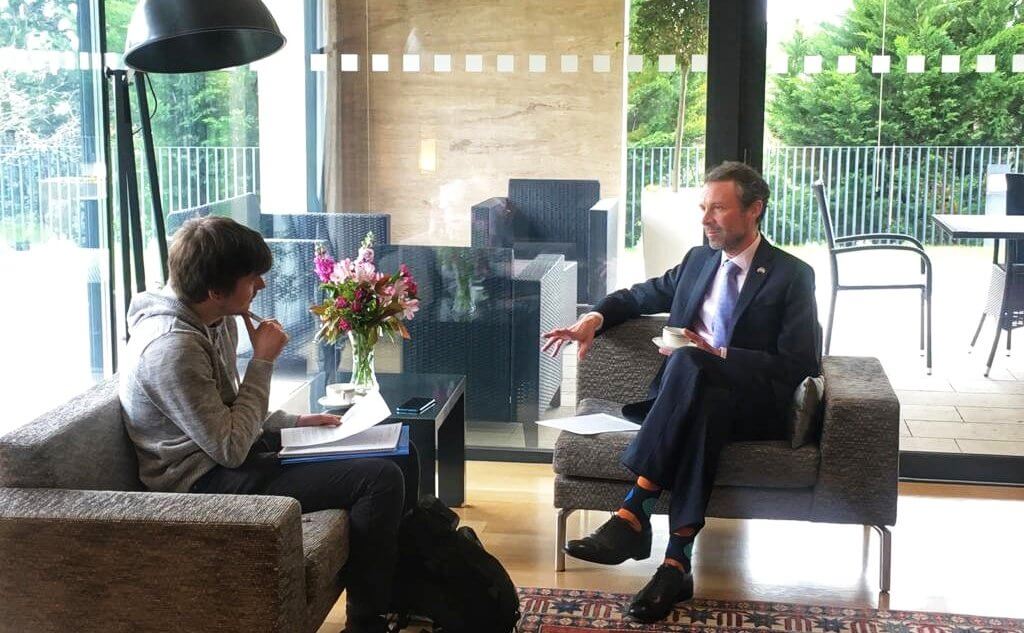
TCN reporter Ivor Kruljac with Ambassador Andrew Dalgleish © British Embassy Zagreb
Croatia and UK sharing western values
Andrew Dalgleish has served the UK as the Ambassador in Croatia since July 2016. He graduated with First Class Honours Degree in European Law at the University of Warwick, which included a year at Bordeaux University IV studying French Law. From 1998-1999 he worked in the Department of Social Security. His extensive knowledge of European law saw him work in UKREP (the United Kingdom Permanent Representation to the European Union) from 1999 to 2004, firstly as the Second Secretary for Social Affairs, and from May 2001 as a First Secretary for the Environment.
That same passion for the environment led him to DEFRA (Department for Environment, Food & Rural Affairs), where he was the Project Manager for the Climate Change effort during the UK Presidency of the EU, and he also represented the EU in UNFCCC plenary meetings. In his service to DEFRA from 2006 to 2008, he participated in the creation of the Office of Climate Change (2006), and moved to be the Deputy Head of Group, in Environmental Land Management too. From 2008 to 2011, Dalgleish continued working as the Head of the European Union Strategy Department, where he held preparations ahead of the Prime Minister’s European Council briefings and assisting other ministries in shaping deliverable policies; coordinating influencing strategies and lobbying efforts within the EU.
''I should tell you, I'd never been to Croatia before I arrived here professionally, and I'm one of those rare British people who hasn't been here on holiday“, Dalgleish began as I asked him about his impressions of the country, and of course, of Croats.
''What struck me the most was the warmth of the people, the welcome, general sense of friendliness. Croats are really proud of their country, and quite rightly so, and they also really want you to love the country too,'' said the Ambassador, adding that the Croats he met took him to lots of places and restaurants where he discovered various new dishes.
He continued that one of the delights of Croatia in his opinion is its variety, and he finds it impossible to pick one location that fascinated him the most.
''I remember going to Vučedol near Vukovar, and it was mindblowing. The walking that I can do in Žumberak, not far from Zagreb is fantastic. You go to Brijuni and you have Roman ruins, or you go to Poreč and you've got the basilica there, or Vis, which is a paradise,'' he stated in his list.
His description of Croats as warm and friendly seems to demonstrate to what we could call Croatian values. But, what are British values? When asked this question, Dalgleish argued that these are habits we may consider to be national characteristics, but they aren't values, per-se.
''Brits are very proud of the idea that we believe in fair play, that will we do the right thing even if we lose the game. Maybe that's why we're terrible at sports,'' the Ambassador said with a touch of humour as he was describing the national characteristics of British citizens.
While stating that Croats should be asked what the UK is most famous for in Croatia, as an Smbassador who frequently talks to Croats, he did manage to come up with some conclusions on the issue.
''Football, clubs such as Chelsea or Manchester City, but also the British sense of humour. Croats laugh at similar things as we do. So much British TV is here, and the cultural exchange is really, really important as well,'' said the Ambassado,r referring to cult shows such as Only Fools and Horses (Croatian: Mucke).
''The Royal Family is very recognisable here, too. I think lots of interest and affection is shown for the Royal Family, and of course our brilliant 'weather' “, the Ambassador added.
When it comes to joint values, the Ambassador noticed that Croatia and the United Kingdom share many opinions that are neither Croatian nor British values, but rather a Western, European, or even Transatlantic view of the world.
''This encompasses a wide range of things that we very often take for granted but which are the foundations of our societies", explained the Ambassador, citing examples the freedom of the media or the rule of law.
''The democracies we live in, embrace and find to be a really important foundation are what we need to protect and defend for the sake of our societies.''
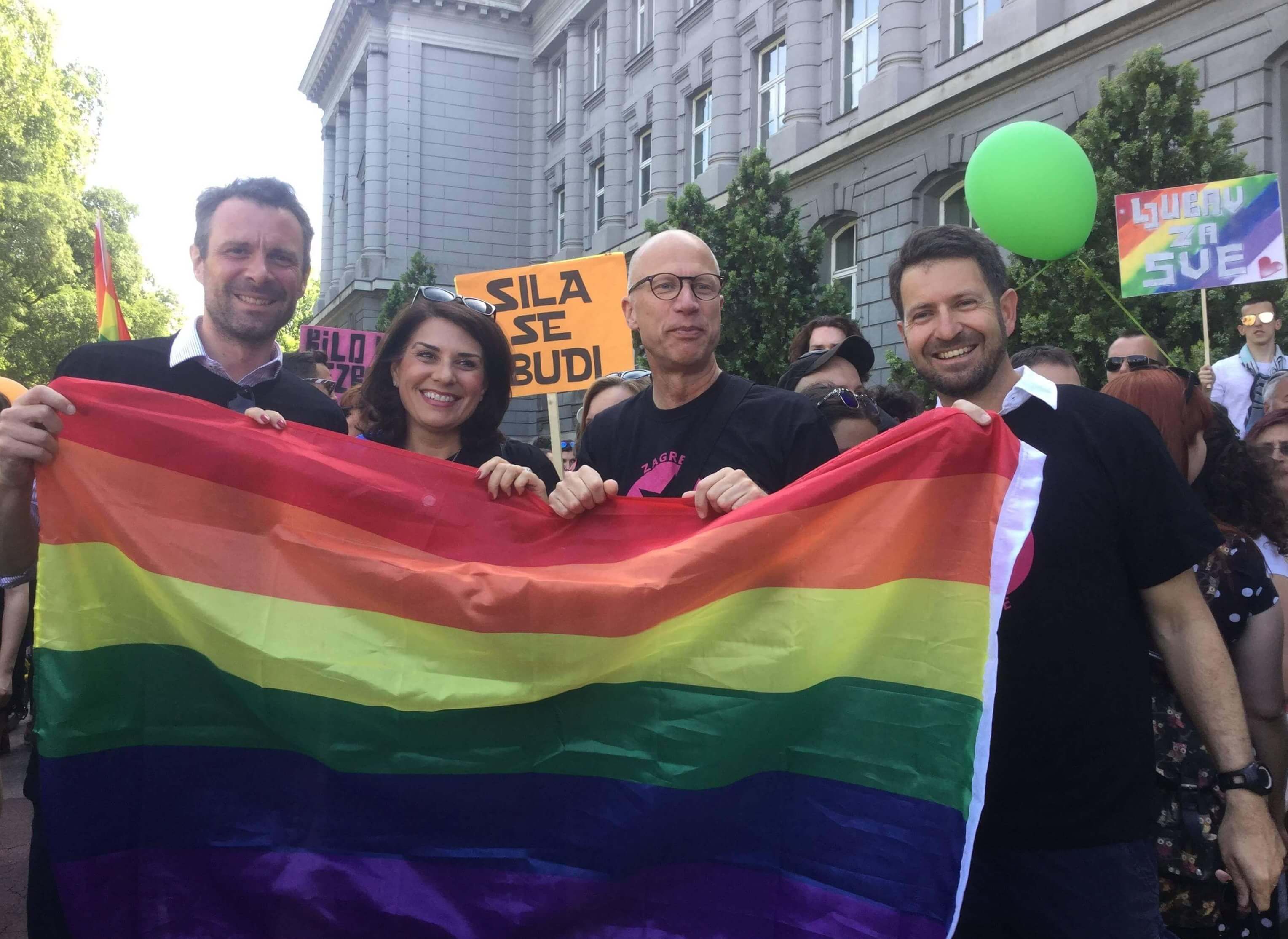
Zagreb Pride, Ambassador Dalgleish with other diplomatic colleagues during Zagreb Pride © British Embassy Zagreb
Things could be better at the commercial level, but there have been improvements...
The values ambassador Dalgeish described are the basis of diplomatic relations between Britain and Croatia, but how good is this relationship, actually? Where is it at its best, and where is it at its worst, where can things be better?
''The starting point is that diplomatic relations are really, really good, and I feel lucky that the cooperation our two countries enjoy is overwhelmingly positive,'' said the Ambassador. He added that as in any close relationship, two countries might disagree about something, but to the British Ambassador, being able to disagree and be fine with that is also a sign of a strong relationship.
''One great expression of our cooperation is NATO where we're really good, very close partners,'' continued the Ambassador, even referring to the recent DEFENDER-Europe-21 exercise in Zadar.
In addition to that, the recent visit of Royal Air Force Aerobatic Team to Croatia's Krila Oluje Pilots is also a good sign of cooperation and mutual friendship.

The Royal Airforce Aerobatic Team and the Ambassador © British Embassy Zagreb
''Croatia occupies an almost unique position in terms of expertise that it can give on Southeastern Europe, as well as comprehensive understanding of what is a very complicated situation in this region,'' he said.
''All of this is very good, strong and positive, and it makes a global impact, and it's not just about how our two countries get along,'' he said.
The Ambassador also added that both Croatia and the UK are members of the Global Media Freedom Pledge and stand for freedom in the media. He also works very closely with both the Croatian Government and Croatian president Zoran Milanović to promote awareness of the threat of climate change.
''You'd expect me to say I communicate the most with the Ministry of Foreign Affairs, and it would be true, it's where diplomatic relations are grown in a formal way. But I also communicate with all branches of the Government, with Parliament and with Pantovčak. Just today, I've been to the ''Dr Fran Mihaljević'' Clinic for Infectious Disease in Zagreb where I talked with its director, Professor Alemka Markotić, about what we can do about COVID-19“, added the Ambassador.
However, as expected, there are areas in which British-Croatian cooperation could be much better.
''Where I'd like things to be better, speaking very frankly, is in commercial relations. The UK has been less present on Croatian market and less accessible due to simple geography, especially when compared to the likes of Austria or Germany. When I arrived here, this is where I said I'd want to try to make a difference. I have made a difference, I hope. A small difference, but its a difference in the right direction, and the commercial relationship is better for that today,'' said the Ambassador.
These small steps saw trade in goods between the United Kingdom and Croatia increase by about 10% in the past few years, a good indicator of how things have been advancing, regardless of the concerns in the past that Brexit might affect it negatively.
''We've also seen investments from the Croatian side into the UK increase in the past few years – for example, Mate Rimac has just opened his research & development centre in the UK – we did help facilitate that through our Department for International Trade (DIT)“, added Ambassador.
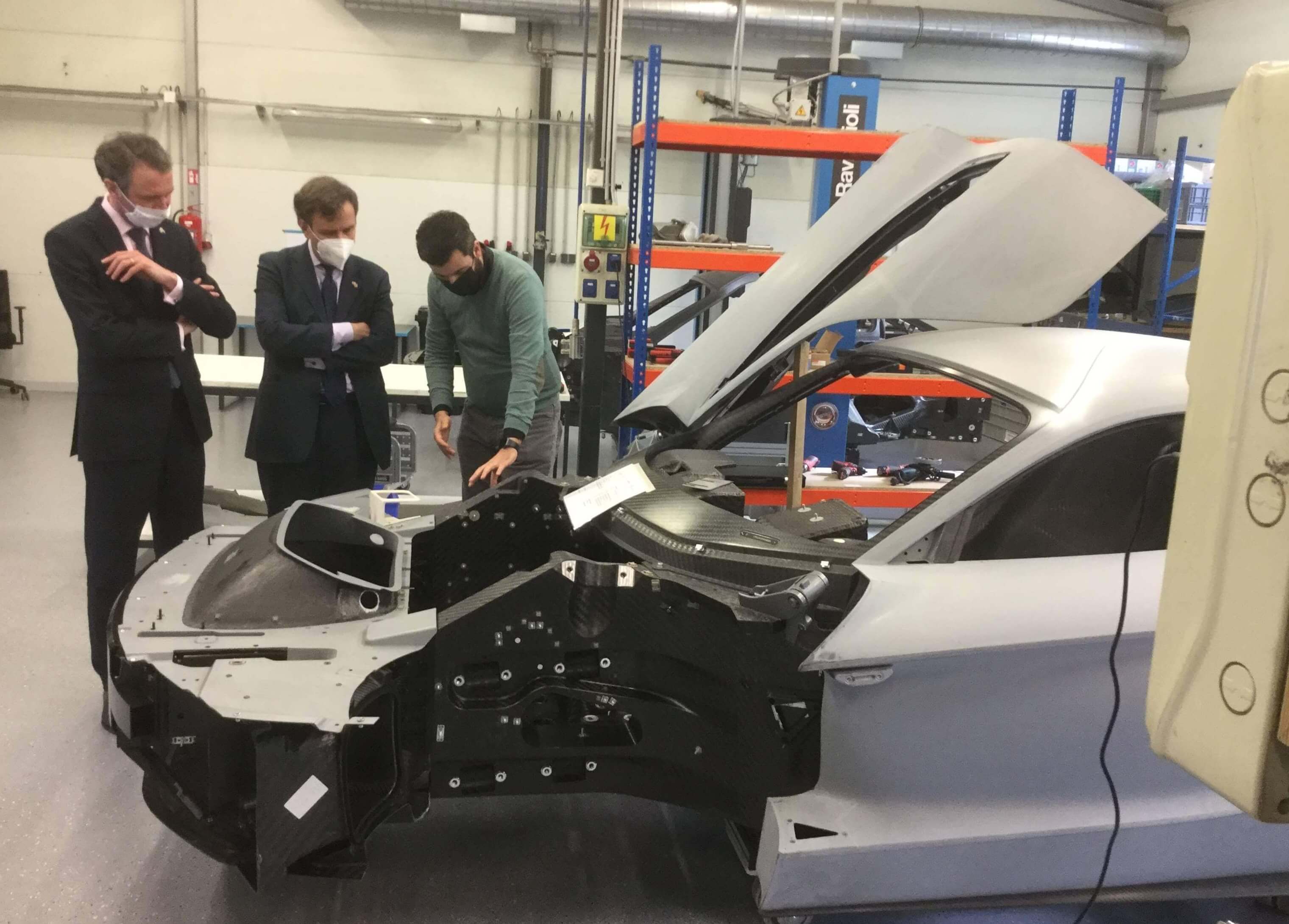
UK Minister Greg Hands and Ambassador Andrew Dalgleish with Mate Rimac in Rimac Automobili © British Embassy Zagreb
In addition, the Ambassador used every opportunity to facilitate business and trade contacts between the UK and Croatia. When UK State Secretary in the Ministry of International Trade, Greg Hands, visited Croatia last month, the Ambassador hosted a dinner for him with several leading Croatian business figures for both sides to explore how they might further improve business connections between the two countries.
On top of that, the recent confirmation from the Justice Ministry that British citizens may purchase property in Croatia only further benefited the development of trading between the two European countries.
Leaving the table for face to face conversation
The cooperation Ambassador Dalgeish described sounds great, but when it comes to diplomatic relations with the UK, the elephant in the room screams out in need of a special mention. Brexit remains a hot topic for the British public, and as Croatia is a member of the EU, what changes can Croatia expect in diplomatic relations with the UK as the European island nation which chose to step away from the bloc?
Dalgleish sees Brexit both as a challenge and as an opportunity to deepen diplomatic relations between the UK and Croatia.
''With 28 members states as it was before, you had so many people around the table that when ministers came together for a council meeting, there were just too many people to have a meaningful conversation one on one. So you'd say ''see you in Brussels'', and you would, and you'd wave, and you'd smile, and you might even say hello. But you don't have a meaningful conversation all the time,'' said Ambassador Dalgeish from his own recollection as he spent a lot of time in Brussels.
''We aren't at that table anymore. That means we're going to have to make more of an effort but also that we will have the opportunity to build a more meaningful relationship with Croatia and I think that's quite exciting for me in the job that I do,'' said ambassador Dalgleish calmly but optimistically.
''Whereas before, our bilateral business might have been conducted during these convenient moments in Brussels at these meetings, that doesn't happen anymore. Now, we will hold them in London, and we will hold them in Zagreb. I think that's quite the opportunity to build something more meaningful than what we had in Brussels,'' stated the Ambassador.
As the UK has a massive impact on the world and can boast of very strong diplomatic relations with other big players on the geopolitical stage, I wondered how important the relationship with Croatia actually is, from the UK's point of view, and in regards to the country's interest in global affairs.
''We look at Croatia as a global partner, and not just from the point of what we get from this bilaterally, but in what we're doing together to make a difference; Croatia sits as a partner,'' the Ambassador pointed out.
Already having mentioned the importance of Croatia's knowledge on Southeastern Europe and the instances of good cooperation through NATO, and issues such as climate change or COVID-19, the British Ambassador's claims are evidently backed up.
''I was sent here by the Foreign Secretary with a very serious mission to deepen the strength of the cooperation that we enjoy. It's a very important mission for me, and I think that's a reflection of how seriously we take the relationship with Croatia,'' confirmed the Ambassador.
The British Royal Family has always been very welcome in Croatia
The Ambassador already mentioned cultural exchange, and the British Embassy as an institution plays a significant role in the cultural promotion of the country. But, given the UK consists of four nations: England, Scotland, Wales, and Northern Ireland, is it possible to represent all these cultures equally? Being Her Majesty Queen Elisabeth II's Ambassador and representing the United Kingdom of Great Britain And Northern Ireland, Dalgeish shows his dedication to the job by equally representing all of the UK's four nations.
''We will proudly fly the St. George's Cross when it's St George's Day for England, but also the Saltire (Scottish flag), when it's St. Andrew's Day. I wouldn't say there is one element of the four nations that is dominant,'' said the Ambassador.
Culture is heavily linked with history, and the UK has been known in the past as a vast empire with colonies that are sovereign independent countries today. As Croatia was never colonised by the UK, are there any differences between the UK's relations with Croatia compared to other countries?
''The UK has a very long list of diplomatic relations, both with the countries who are part of Commonwealth, who were previously colonies, and with countries who were not colonised. So, there's no difference in forming a relationship with Croatia in comparison to such countries. There's nothing I can do about what happened in 1600's or 1700's, but I want to see what we can do in 2021,'' said the Ambassador, stating that the Ambassador's job is to look ahead, not backwards, to work on building the future, while acknowledging all the sensitivities of the past.
As the Ambassador already mentioned, his regular cooperation with the official bodies of the Republic of Croatia is the formal level of communication, while cultural exchange also has a key element in non-formal communication, particularly in education.
''I love going to schools. Talking to the kids about what they think about the UK, and what can they teach me about Croatia, and going to English lessons and causing chaos,'' said the Ambassador on his experiences with the school system in Croatia.
With the mention of the school system in Croatia, I couldn't help but recall my experience in education. Croatians seem to be quite talented when it comes English, but it is mostly pushed towards the American version of English.
''Oh yes I know, it's tragic,'' Ambassador Dalgleish joked in response when I shared my recollections.
He continued by saying that he is happy to see Croats speaking English so excellently, and he doesn't mind what version they learned, nor does he have any intention to have British English compete with American English.
''I don't hear too many American accents when talking to Croats, maybe it has something to do with British TV shows, maybe it doesn't, I don't know. But either way Croats should be very proud of how well they speak English,'' he concluded.
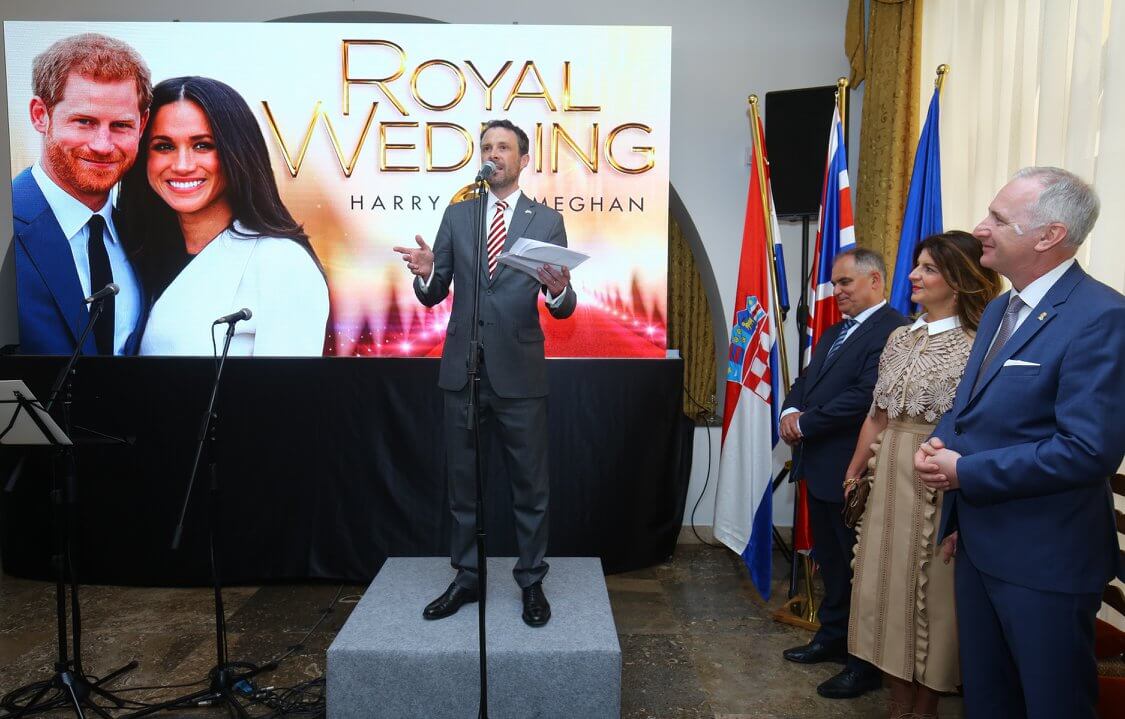
Ambassador Dalgleish on the Royal Wedding Party in Split © British Embassy Zagreb
As also already mentioned, the Royal Family is a big part of the of the fabric of Britain as it is a parliamentary monarchy.
The Royal family, particularly Prince Charles and Duchess Camilla seem to be very fond of Croatia indeed. Their last visit back in 2016 (following the Prince's earlier visit in 1996) saw the meeting with former Prime Minister Tihomir Orešković, former President Kolinda Grabar Kitarović, for whom Prince Charles highlighted his particular interest in the Croatian economy, as well as an interest in investing in Croatian youth. They also attended the commemoration of the 400th anniversary of the death of the famous English writer and poet William Shakespeare at the Croatian National Theatre (HNK) in Zagreb.
''Their Christmas card even had a photo of them with the members of a folk band from Osijek“, said Ambassador Dalgleish referring to the photo the British Royals took with the dancers of the HKUD 1862 ensemble.
And as Glas Slavonije reported, Osijek is very special to Prince Charles as his Great Grandfather Franz von Teck was born there.
Most recently, however, the Royal Family suffered a tragic loss as the much-loved Prince Philip passed away. Croatian Prime Minister Andrej Plenković expressed his deep condolences to Queen Elizabeth II publicly on Twitter, but as the Ambassador pointed out, he also sent condolences through official channels. Social media and overall technological progress now allows world leaders to communicate more directly, but it doesn't diminish the role of the British Embassy.
''Everyone who wanted to express their condolences, expressed them, from Pantovčak, to Parliament and the Government. Social media is an additional tool for us regarding public statements, but of course, embassies remain here for those sensitive issues that need to be discussed Government to Government, not over social media. We're also here for our citizens, and we can't be present in the whole country, so travelling, but also social media, are also very important here,'' explained the Ambassador.
The always attractive Dubrovnik was found to be the best example when it comes to culture in the country, as Game of Thrones and Star Wars were filmed there.
In the UK, the film industry, in addition to private incentives, gets financial support from the state, as the British Film Institute (BFI) is sponsored by a Government department. Following the examples of Star Wars and GoT, could there be more promotion from the BFI of Dubrovnik or Croatia in general as a good filming location?
''I don't really need to say anything about Dubrovnik. Dubrovnik speaks for itself, and more Brits visit Dubrovnik annually than anyone else,'' said the Ambassador with delight.
But if Dubrovnik did happen to need a good word or two; the Ambassador stated that he is not the tourist bord, and promoting Dubrovnik is not part of his duties.
''If someone from the UK contacts me and says that wants to film anywhere in Croatia, but is facing problems, then I'm here. But in general, the less I need to intervene, the better“, said the Ambassador adding that he found out about UK film producers filming in Croatia after it had already happened. One of the more recent examples of that was the filming of the ''The Ipcress File'' series in Zagreb, and the fact that the ambassador didn't need to intervene again only proves the steady and good relations between the nations.
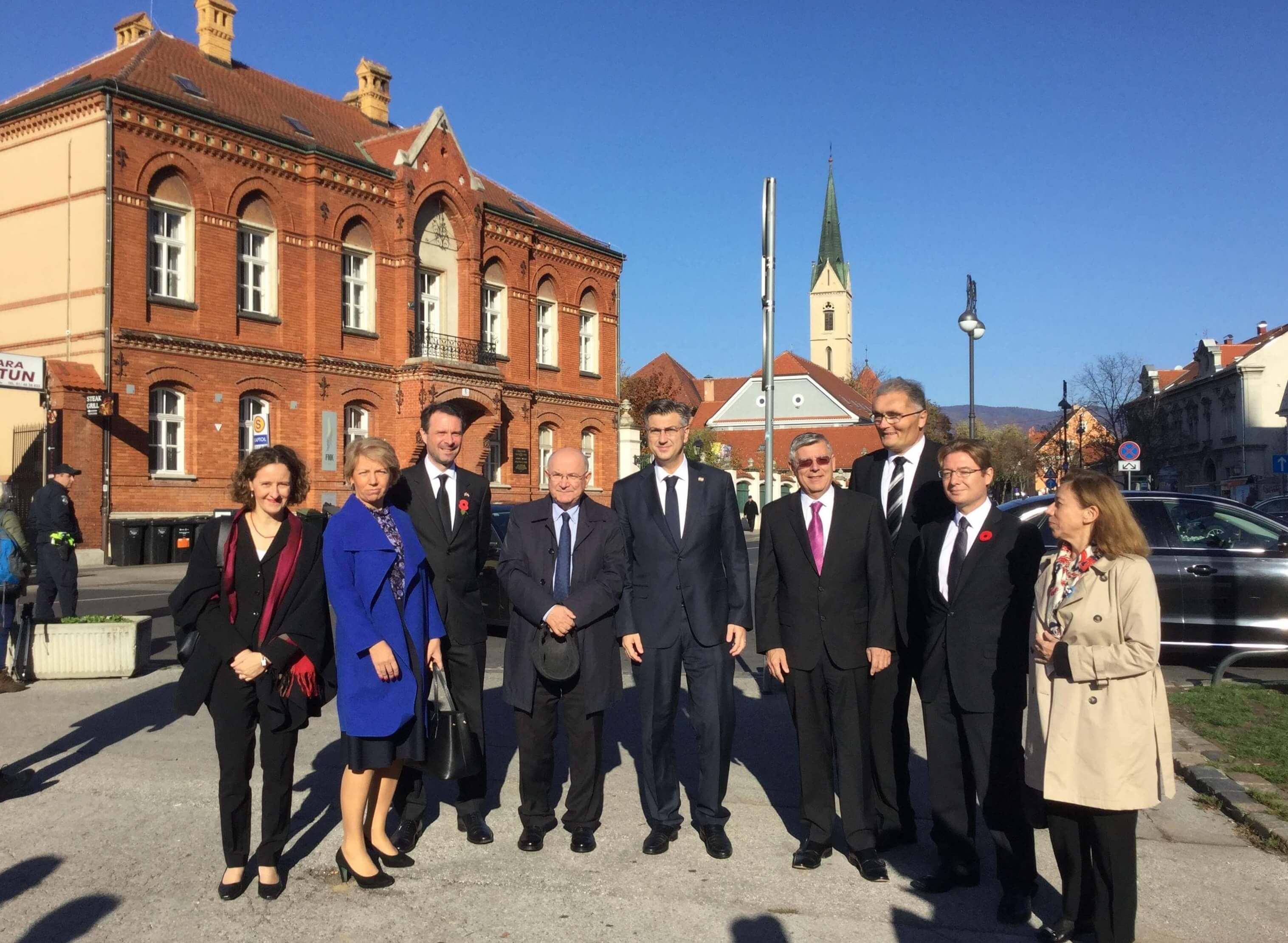
Ambassador Dalgleish, other Ambassadors and Croatian officials attending a Mass for all victims of WW2 at the Zagreb cathedral © British Embassy Zagreb
British and Croatian Ambassadors: Swapping countries but closely talking and cooperating
Foreign embassies, of course, are in Croatia for foreign citizens, and the British Embassy is no exception to that rule.
In addition to the British Embassy and a consul in Zagreb, the UK has two additional consuls: in Split and Dubrovnik, to make sure it is present for UK citizens, not just visitors, but also for Brits who work and live in Croatia.
''We have an honorary consul in Dubrovnik, which isn't officially part of the embassy, but is there to assist our citizens visiting Dubrovnik,'' pointed out Ambassador Dalgleish praising honorary consul Mark Thomas for doing a great job.
When it comes to Croats, visas to visit the UK are luckily not needed, but Croatian citizens can contact the embassy to get more information about Great Britain should they need to.
''When it comes to trying to invest in the British market or getting their products or expertise into the UK, Croats need to contact the Croatian Embassy in London. I'm frequently in contact with the Croatian Ambassador there, Igor Pokaz, who is doing a brilliant job for our two countries to fund and nurture different ways of cooperation,'' explained the Ambassador when discussing his relationship with the Croatian Ambassador in London, Igor Pokaz.
Overall, British-Croatian diplomatic relations are good in general, and the Ambassador's assurance that Brexit can be an opportunity to deepen the already good relationship is a promise to the bright future of friendship. But, as it takes two to have a combo as good as fish & chips, Croatia also has to show that it is willing to continue to develop a good friendship with the UK.
If you're a British citizen or a Croatian citizen in need of information, here is how you can reach a British diplomatic mission in Croatia:
In Zagreb:
British Embassy
Adress: Ivana Lučića 4
Mail: This email address is being protected from spambots. You need JavaScript enabled to view it.
Phone number: +385 1 60 09 100
British Council (for cultural realations):
Adress: Savska 32
Mail: This email address is being protected from spambots. You need JavaScript enabled to view it.
Phone number: +385 1 48 99 504
More info on British Council official website.
In Split:
British Consulate
Adress: Obala Hrvatskog narodnog preporoda 10/III
Phone number: +385 1 60 09 100
In Dubrovnik:
British Honourary Consulate
Address: PP 454
Phone number: + 385 1 60 09 100
For all the latest news about the British Embassy straight from the source, visit their official website. You can also follow them on Facebook, Youtube, Flickr, Instagram and Twitter (the British Ambassador is on Twitter and Instagram too).
To read more from the series "Friends of Croatia", follow TCN's dedicated page.
For more about UK - Croatia relations, follow TCN's dedicated page.
Rovinj Sea Research Centre Celebrating 130 Years of Work
May 18, 2021 - The Rovinj Sea Research Centre turns 130 in 2021. It is the place in Croatia for oceanographic research and all things science related to the preservation of the sea and maritime life.
Established back in 1891 as Berlin's Aquarium Zoological Station, the research Institute is known today as the Rovinj Sea Research Centre (CIM), and last week it celebrated 130 years of work. An affiliate of the Ruđer Bošković Science Institute (IRB), that institute recently reported that CIM currently has 54 employees working in four laboratories, and the centre is heavily involved in numerous impressive scientific projects.
''This includes five projects of the Croatian Science Foundation (HrZZ), worth 5,855 635 HRK, three projects financed within the INTERREG cross border programme (worth 1,326 000 euros), three projects with European structural and investment funds (7,189 531 HRK), and two projects financed within the EU programme for research and innovations, OBZOR 2020, valued at 179,360 euros,“ says the IRB official website.
The section of the IRB page dedicated to CIM adds that the centre offers a multidisciplinary take on the research of the sea, offering both basic and applicable oceanographic research. This includes six areas of interest: processes and dynamics in the food chain, examining the dynamics of water masses, ecology (species and the interrelations of species in both clean and in polluted waters), sea organism research (ecological, physiological, and genetic features of organisms, and a pollution effects study), the monitoring of pollution and sea quality, and finally, the monitoring of eutrophication (a process in which the environment becomes enriched with nutrients which can trigger the development of algae and cause an imbalance in the ecosystem).
Set in the beautiful town of Rovinj on the Istrian peninsula because of the clear waters of the Adriatic sea, CIM is on a mission to preserve marine life and its biodiversity.
CIM truly has a rich tradition, having conducted international systematic research and monitoring of the marine ecosystem of the Northern Adriatic for over 30 years. ''This approach became a model for the regional organisation of the European systematic monitoring of the coastal sea,'' says IRB.
IRB adds that in this long tradition, the Croatian science programme of monitoring the Northern Adriatic played a huge role. Having begun fifty years ago, it developed into the Jadran Project, making Croatia one of the first countries in all of Europe to have developed a systematic approach to the monitoring of the sea.
''Additional confirmation of the tradition and scientific quality of CIM can also be seen in the recent joining of CIM to JERICO – the Joint European Research Infrastructure network for Coastal Observatory, making CIM a partner of some of the most famous European Institutes“, concluded the IRB's explanation.
Learn more about Beaches in Croatia on our TC page.
For more about science in Croatia, follow TCN's dedicated page.
Ruđer Bošković Science Institute Combats Climate Change by Developing New Material
May 5, 2021 - With ecology being the key to survival, the Ruđer Bošković Science Institute combats climate change by developing a new material known as CuZn-MOF-74.
The pandemic is nasty, the nuclear holocaust is a scary thought, but greenhouse gases remain an omnipresent potential for the death of us as they trigger climate change on whose negative effects scientists have been warning us about for decades.
Like the United States, the Environmental Protection Agency informs on its website, these gases trap the heat in the atmosphere, which in terms raises the temperature we experience.
The website lists the main types of these airier troublemakers:
CO2 (Carbon dioxide - enters the atmosphere through burning fossil fuels (coal, natural gas, and oil), solid waste, trees, and other biological materials, and also as a result of certain chemical reactions. It is removed by plants that use it for photosynthesis – a process that provides food for the pants and oxygen for other beings).
CH4 (Methane-emitted during the production and transport of coal, natural gas, and oil. Methane emissions also result from livestock and other agricultural practices, land use, and the decay of organic waste in municipal solid waste landfills).
N2O (Nitrous oxide - emitted during agricultural, land use, industrial activities, combustion of fossil fuels and solid waste, as well as during treatment of wastewater).
Last but not least:
Fluorinated gases ( such as Hydrofluorocarbons, perfluorocarbons, sulfur hexafluoride, and nitrogen trifluoride are synthetic, powerful greenhouse gases that are emitted from a variety of industrial processes. Fluorinated gases are sometimes used as substitutes for stratospheric ozone-depleting substances. These gases are typically emitted in smaller quantities, but because they are potent greenhouse gases, they are sometimes referred to as High Global Warming Potential gases)
Each of these gases can stay in the atmosphere for a very long time, and transferring these gases into something else is a challenge to beat. Fortunately, at least for carbon dioxide, we might be getting closer to the solution than we think.

Pixabay
Ruđer Bošković Science Institute (IRB) in Croatia reported on its website that they are at the brink of a new material that can selectively transform carbon dioxide into methanol alcohol. The green chemists in Zagreb were closely cooperating with colleagues from the Slovenian Chemical Institute (KI), and McGill University in Canada. The results of their mutual research, in a more further scientific detail, are published in a scientific article on the prestigious ACS Publications.
But in the summarization, doctoral candidates Tomislav Stolar and Valentina Martinez, alongside dr. Bahar Karadeniz, under the lead of dr. Krunoslav Užarević (IRB), and dr Tomislav Friščić (McGill University) developed a bi-metal proposal coordination material known as CuZn-MOF-74. The layman speaking complex name is owned to the fact it's made from copper (Cu) and zinc (Zn) using a mechanic-chemical method of making bi-metal metalorganic networks known as MOF-74. As TCN previously reported, that method is an environmentally sustainable synthetic strategy that is further elaborated in a scientific article in 2019.
The catalytical properties of this material were tested KI in Ljubljana with the help of the scientists from the Institute: dr. Blaž Likozar, dr. Gregor Mali, dr. Ana Bjalić, and Anže Prašnikar.
The results have shown that this material has a modest catalyst (meaning it speeds up) activity to synthesize methanol, and post-reaction presented the scientists with a non-porous material which showed multiple enhancement of both catalyzation and selection for methanol synthetization.
„This research is a good example of multidisciplinary and international collaboration between strong research centers in the region. To me, as a young scientist, it's important that I can work on the current issues, such as transforming carbon dioxide into methanol, thanks to the guidance of dr. Užarević. There is a big potential for switching to sustainable chemical processes through the program of European Green plan, and research in that field should be the priority“, said the lead author Tomislav Stolar, a doctoral candidate in the IRB's laboratory for green synthesis.
The IRB official website added that the search for an effective catalyzation to transform carbon dioxide into methanol is the focus of scientists worldwide. Methanol could also be then used as a fuel and replace the current fossil products.
Today you already have the term „Methanol Economy“ that predicts methanol will impose as the vital compound to store energy, as a fuel, and a source of carbon to synthesize valuable compounds. Efficient synthesis of methanol from carbon dioxide presents an example of sustainable chemical reaction of added value, and with great economic potential“, concludes the press release on IRB.
Apart from IRB scientists combating climate change, Croatia takes care of the environment, particularly national parks on whom you can learn more on our TC page.
For more about science in Croatia, follow TCN's dedicated page.
Croatian National Bank: Banks Still Do Not See Climate Change As Serious Threat to Business
ZAGREB, 29 April, 2021 - Most banks in Croatia still do not see climate change as a serious threat to their business, a survey carried out by the Croatian National Bank (HNB) showed on Thursday.
The survey was presented as part of an online conference called "The Role of Banks in Greening Our Economies", organised by the HNB and the European Bank for Reconstruction and Development (EBRD).
The survey, carried out among 20 Croatian banks, showed that the banks did not see climate change as an immediate and serious threat to their business.
Only one bank said that climate change would have a generally significant impact on the Croatian banking system, 11 banks said that the impact would be moderate, while eight said that it would be insignificant.
Only two banks have a climate change-related strategy included in their overall business strategy, expressing concern about risks and anticipating possible changes to the regulatory framework. On the other hand, 15 banks said they were waiting for the regulators to take the initial steps in this regard.
Responding to the question about risk materialisation, 10 banks said that climate risks would not materialise in the near future, while 11 said they were not attaching major importance to exposure to climate change and environmental risks to their portfolio.
Physical risk includes the financial impact of climate change, and five sectors in Croatia are particularly vulnerable to it - tourism, agriculture, forestry, fisheries and energy distribution. More than a quarter of Croatian banks' exposures to non-financial institutions concern these sectors, mostly tourism, the survey showed.
However, none of the banks has so far assessed its exposure to climate and environmental risks, citing lack of reliable data and methodology as well as lack of qualified staff.
The sectors facing the biggest transition risk from climate change are transport and traffic, agriculture, motor vehicles, energy and oil products, and construction.
Only 9 banks offer green product to their customers
Most banks recognise opportunities brought by the transition to a low-carbon economy, with three-quarters of them saying they could benefit from this transition by financing green projects. However, only nine banks said they were offering a green product to their customers, such as loans for the energy renovation of buildings or the purchase of electric vehicles.
HNB Governor Boris Vujčić said in his opening remarks that both the HNB and EBRD had acknowledged their responsibility for highlighting the role of banks in the climate transition. He recalled the Paris climate change agreement of 2015, which has been ratified by 189 countries, saying that it set ambitious goals to reduce greenhouse gas emissions and prevent further global warming.
For more about business in Croatia, follow TCN's dedicated page.
Slovenia, Croatia, Italy Sign Statement on Protection of Adriatic
ZAGREB, 21 April, 2021 - The foreign ministers of Slovenia, Croatia and Italy signed in Brdo Pri Kranju, Slovenia on Wednesday a joint statement on the protection of the northern Adriatic, after plenary talks on joint cooperation in that area.
Speaking to the press after the signing, Anže Logar of Slovenia said that he, Gordan Grlić Radman of Croatia and Luigi di Maio of Italy endorsed conclusions on strengthening the three countries' cooperation in the protection of the Adriatic, which he said was the basic framework for strengthening cooperation in areas of common interest.
Last year Croatia and Italy announced the proclamation of exclusive economic zones in the Adriatic, including Slovenia in consultations on the matter. Slovenia, which under international law does not have the right to do the same, assessed that as a positive move by its two neighbours.
Early this February, the Croatian parliament proclaimed an exclusive economic zone in the Adriatic, giving Croatia additional rights in relation to the Ecological and Fisheries Protection Zone declared in 2003 to build artificial islands and exploit the sea, wind and currents in that zone in line with the UN Convention on the Law of the Sea.
At a meeting in Trieste on 19 December, the three ministers adopted a joint statement in which they share a vision of the sea as a bridge uniting all the peoples in this area and a source of progress for all. They were agreed that the Adriatic, as a closed sea with intensive traffic and a vulnerable eco-system, needs an integrated approach to environmental protection and sustainable development.
For more about ecology in Croatia, follow TCN's dedicated page


